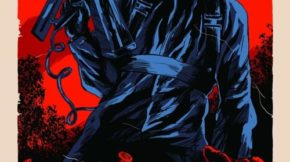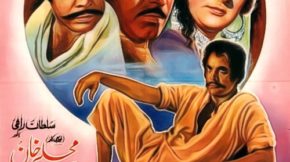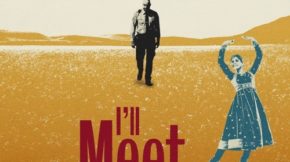I’ll Meet You There (Bismil) (2020)
I’ll Meet You There (2020)
Cast: Faran Tahir, Qavi Khan, Nikita Tewani
Director: Iram Parveen Bilal
Nutshell: American family of Pakistani origin must confront past and present demons with the arrival of a visitor from Pakistan.
It’s been long since there was any inclination to watch a new Pakistani film. Personally speaking, the more Pakistani movies mimic the films from across the border rather than follow their own trajectory, the less attractive they appear.
The new films are characterised by a desperate attempt to recreate a Bollywood vibe about 15 years past its sell-by date. We are still recycling Dabangg & Gangs of Waseypur because we have dumbed down our cinema to that level (barring Kamli). Only two kinds of films seem to be reaching screens. Mindless brain dead rom coms with ageing Kala Kolaed actors behaving like idiots (not obscene?) The other genre is the glorified gung-ho feature-length advert for the war machine.
So audiences are a little starved, and whenever anything mildly cerebral comes along, the Censor Board is kind enough to protect us from losing our morality despite the violence and warped sexuality of the depraved Pashto and Punjabi films, which are deemed perfect for viewing by young and old alike. Films with women being honour killed for being dirty stage dancers are considered acceptable by the same Censor Board.
Yet films depicting American Pakistanis or Muslims as real people with real issues and problems are deemed objectionable. Mindless garbage, vile propaganda and glorying honour killing are all in a day’s work and can be watched by children and blood-lusting adults any time of the day on TV or any of the channels where Pakistani Movies and dramas are aired. Any film that dares to depict a Muslim human being as identical to any other human being is perceived as “depicting Pakistan in a negative light”.
Irfan Tahir plays a well-respected Cop in Chicago, living with his daughter, who is obsessed with dancing as her dead mother used to be and is currently on the verge of getting a spot at the world-famous Juilliard School. Her father supports her goals but insists that she can dance as long as “kathak” is not part of the course.
The question in the air is, what is the connection between the dead mother and “kathak”? Meanwhile, Irfan’s almost estranged old father suddenly arrives from Pakistan for a visit “to see his granddaughter, Dua”. A frantic Irfan tells his daughter to hide all evidence of dance in the house, and she soon discovers why. Dua’s grandfather, played by Qavi Khan, introduces an element of friction because of his rigid ways and gradually encourages Dua to seek and understand her faith.
Simultaneously the FBI put Irfan in a spot, and he must infiltrate the local mosque for information about some possible money transfers to banned “charities”. As we head for a clash of interests and interpretations of God and faith, the film throws up some relevant questions in a non-sensational manner.
Nothing about the film is remotely offensive. The only conclusion that one can draw as to why the Pakistani Censor Board Banned the movie for “depicting Pakistan in a negative light” is because, sadly, many of us prefer to live like ostriches, with our heads buried under the sand, blissfully ignorant of reality. A public fed a diet of mindless films that numbs the brain is far more manageable than a public that comes out of a cinema asking questions. Keep it simple, THINK and DO as YOU ARE TOLD.
I’ll Meet You There may not be the most groundbreaking film ever. Still, it’s a relevant and honest one rooted in real issues and not a make-believe world of buffoonery like Dabangg and Paris Nahi Jaoongi (currently in the works, no doubt).
There hasn’t been a Pakistani Censor Board as insecure as the present one since the days of Zia ul Haq. It’s hell-bent on pulverising its audience’s brain cells with movies that mock dwarves, deformed people, dark-skinned people, Africans, East Asian people, minorities, fat people, thin people, ugly people, gay and transgender people and disabled people. The list could go on.
Whoever is not a Sunni Muslim makes perfect fodder for a little good-natured humour. Select ten films from any decade of Pakistani cinema and see how much the movies reek of discrimination. Was the film about Serial Killer Javed Iqbal also banned because it depicted Pakistan negatively? You can convince yourself you are living in a bed of roses. Keep repeating “It’s a bed of roses” repeatedly, and maybe it will become one. Perhaps that is what the Censor Board’s strategy is. Wishful thinking.
Meanwhile, the film is directed with admirable restraint. The performances are unusually natural and unaffected by our typical “filmi and drama” style, full of stylised dialogue delivery with dramatic pauses. Irfan Tahir impresses, as does Nikita Tewani as his daughter—an American actress of Indian origin.
Notably, most Asian female characters in the UK, Australia or the US are played by Indians, West Indians or Sri Lankan actors. The Zia ul Haq mentality that acting is only for the immoral still prevails.
Qavi Khan, a survivor from the 1960s, turns in a solid performance. Better for being free from the cliché mannerisms that “good acting” involves in our parts. Men need to be excessively loud and have “swag”, while women must look gorgeous, preferably blonde, like a well-endowed Bratz Doll and throw themselves violently all over the hero is a talent that is most in demand. Over the years, Saima, Sana, Meera, Resham and co have perfected it. We like women to know their place at home, at work and in the movies.
A strong independent woman who does not rely on a man is perceived as a “negative depiction of Pakistan”. Many prefer to regard this non-existent thing called Pakistani Culture as monolithic when Pakistan combines several distinctly differing cultures under the umbrella of Islam.
Religion is certainly a part of “Culture”, but music, food, clothing, customs, traditions, weddings, language, Punjab, Sind, Balochistan, Pushtoon, and Urdu-speaking migrants all have distinct differences which enrich Pakistan, not detract from it. To claim that Pakistan has one culture is a denial of facts.
A move was released in Pakistan recently, starring the nation’s top star in the lead. The posters glorify the image of him about to detonate a suicide bomber jacket. This film and scene were deemed perfectly appropriate for viewing by a general audience, including children, by the Censor Board.
Another film had the hero turn out to be the serial killer of Stage Dancers, and right at the end of the film, the police pat him on the back for a job well done and set him free. The Censors found no problem with the morals of this film’s message.
The film shines a light on the vast differences in the “interpretation” of the faith. Words written in Arabic have been interpreted and translated by “scholars” in several ways. Every one of the interpreters has a different life experience and, thus, a unique understanding of the exact words. The film’s next logical question is,” With so many accurate interpretations, which is the most correct?”. Are these differences in understanding due to political convenience or linguistic nuances? Is there something Lost in Translation along the process? Every different perspective claims the “truth”.
This film chooses “good intentions” as its moral compass, and more than hints that there is One God, but different languages have different words for it. You can agree or disagree, and banning a film like this smacks insecurity or a condescending attitude towards your adult populace.
Summary
Banned by The Pakistani Censor board for showing "Pakistan in a negative light". Watch it and draw your own conclusions about the film and the Censor Boards' mindset.












